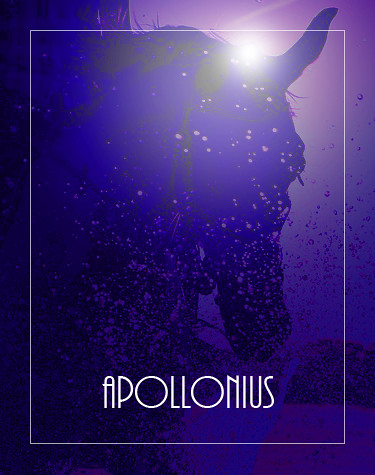
Volume XIII, Issue XI
Apollonius
By Bob Kirchman
Copyright © 2017, The Kirchman Studio, all rights reserved
Chapter 5: Sarah Cohen Ben-Gurion
Certain springs are tapped only when we are alone. The artist knows he must be alone to create; the writer, to work out his thoughts; the musician, to compose; the saint, to pray [and] women need solitude in order to find again the true essence of themselves.” -- Anne Morrow Lindbergh
In fact, Sarah Cohen was no stranger to the business of jumping into new worlds. As a girl she was always looking for new adventure. She crawled at six months and never stopped after that. She played for hours in the woods behind her house and most of her playmates were boys. Summertime allowed day-long adventures with them. At night, she was drawn to read Narnia, Tolkien and J. K. Rowling. She took up horseback riding and scared the wits out of her dear mother, it is said. For Sarah, the collaboration of man and beast opened up new worlds of speed and sensation. Once she’d learned to gallop a horse, she only stopped in kindness to the animal.
Her girlhood in suburban New Jersey probably wouldn’t count as being all that extraordinary. It was those quiet lazy afternoons in the Summer woods that fueled her imagination. Camping out in the Pine Barrens with her family and in the wild mountains of Western North Carolina, she was first drawn to the stars. One exceptionally clear night she lay in the open on a mountain roan as the rest of her family slept soundly and looked up at the Milky Way. “How many stars are out there?” She mused. “What wonders lie out there that I cannot see?”
Then came the day she announced to her surprised family that she was going to Israel. She was going to serve in the IDF! Well, somehow along the way she took a test for pilot skills, aced it, and the rest is history. No doubts her confidence as an aviator was first forged on the back of a strong horse! She flew F-17’s and that is how she came under the command of her husband when she joined his squadron.
The Alaska Space Program opened up the possibility of a childhood fantasy coming true for both her and her husband, as they both admired the American astronauts of the nineteen-sixties and the seventies who had taken man to the moon. Sarah also admired Anne Morrow Lindbergh, who, together with her husband, had pioneered the establishment of air service around the world. Anne and Charles had in fact flown together in a relationship very similar to hers and Abiyah’s. Anne married Charles in 1929 and got her glider pilot’s license a year later. She served as Lindbergh’s navigatior, radio operator and copilot as the famous aviator worked to lay out the routes for modern air travel. Their travels together took them to Europe, Asia and the Caribbean.
A true Renaissance person, Anne Lindbergh became a writer as well. Inspired by Anne's stories, Sarah kept a detailed diary of life aboard the Great Northern and in her spare moments took thousands of photographs as she planned to create a permanent record of their own historic adventure. She shuddered at the thought of the terrible kidnapping of Anne’s first child and wondered how she and Abiyah might drop out of the public eye and find some anonymity when they had their own children. Sarah Cohen was a dreamer, a visionary, and she was driven on in her present task by the knowledge that most of all one must give their children dreams and vision.
(to be continued)
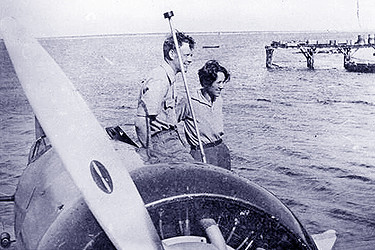
Charles and Anne Morrow Lindbergh traveled the world in airplanes such as this as they charted the routes for intercontinental air service. She acted as his copilot, radio operator and navigator.
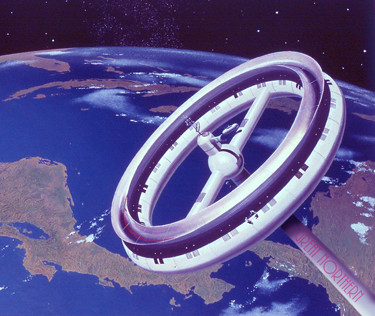
2001, a Space Odyssey
This film was made in the days before CGI, but it still defines the images of long-distance spaceflight.
Around the World in 80 Days
By Jules Verne, Chapter XI
In which Phileas Fogg Secures a Curious Means of Conveyance at a Fabulous Price
The train had started punctually. Among the passengers were a number of officers, Government officials, and opium and indigo merchants, whose business called them to the eastern coast. Passepartout rode in the same carriage with his master, and a third passenger occupied a seat opposite to them. This was Sir Francis Cromarty, one of Mr. Fogg’s whist partners on the Mongolia, now on his way to join his corps at Benares. Sir Francis was a tall, fair man of fifty, who had greatly distinguished himself in the last Sepoy revolt. He made India his home, only paying brief visits to England at rare intervals; and was almost as familiar as a native with the customs, history, and character of India and its people. But Phileas Fogg, who was not travelling, but only describing a circumference, took no pains to inquire into these subjects; he was a solid body, traversing an orbit around the terrestrial globe, according to the laws of rational mechanics. He was at this moment calculating in his mind the number of hours spent since his departure from London, and, had it been in his nature to make a useless demonstration, would have rubbed his hands for satisfaction. Sir Francis Cromarty had observed the oddity of his travelling companion — although the only opportunity he had for studying him had been while he was dealing the cards, and between two rubbers — and questioned himself whether a human heart really beat beneath this cold exterior, and whether Phileas Fogg had any sense of the beauties of nature. The brigadier-general was free to mentally confess that, of all the eccentric persons he had ever met, none was comparable to this product of the exact sciences.
Phileas Fogg had not concealed from Sir Francis his design of going round the world, nor the circumstances under which he set out; and the general only saw in the wager a useless eccentricity and a lack of sound common sense. In the way this strange gentleman was going on, he would leave the world without having done any good to himself or anybody else.
An hour after leaving Bombay the train had passed the viaducts and the Island of Salcette, and had got into the open country. At Callyan they reached the junction of the branch line which descends towards south-eastern India by Kandallah and Pounah; and, passing Pauwell, they entered the defiles of the mountains, with their basalt bases, and their summits crowned with thick and verdant forests. Phileas Fogg and Sir Francis Cromarty exchanged a few words from time to time, and now Sir Francis, reviving the conversation, observed, “Some years ago, Mr. Fogg, you would have met with a delay at this point which would probably have lost you your wager.”
How so, Sir Francis?”
Because the railway stopped at the base of these mountains, which the passengers were obliged to cross in palanquins or on ponies to Kandallah, on the other side.”
Such a delay would not have deranged my plans in the least,” said Mr. Fogg. “I have constantly foreseen the likelihood of certain obstacles.”
But, Mr. Fogg,” pursued Sir Francis, “you run the risk of having some difficulty about this worthy fellow’s adventure at the pagoda.” Passepartout, his feet comfortably wrapped in his travelling-blanket, was sound asleep and did not dream that anybody was talking about him. “The Government is very severe upon that kind of offence. It takes particular care that the religious customs of the Indians should be respected, and if your servant were caught —”
Very well, Sir Francis,” replied Mr. Fogg; “if he had been caught he would have been condemned and punished, and then would have quietly returned to Europe. I don’t see how this affair could have delayed his master.”
The conversation fell again. During the night the train left the mountains behind, and passed Nassik, and the next day proceeded over the flat, well-cultivated country of the Khandeish, with its straggling villages, above which rose the minarets of the pagodas. This fertile territory is watered by numerous small rivers and limpid streams, mostly tributaries of the Godavery.
Passepartout, on waking and looking out, could not realise that he was actually crossing India in a railway train. The locomotive, guided by an English engineer and fed with English coal, threw out its smoke upon cotton, coffee, nutmeg, clove, and pepper plantations, while the steam curled in spirals around groups of palm-trees, in the midst of which were seen picturesque bungalows, viharis (sort of abandoned monasteries), and marvellous temples enriched by the exhaustless ornamentation of Indian architecture. Then they came upon vast tracts extending to the horizon, with jungles inhabited by snakes and tigers, which fled at the noise of the train; succeeded by forests penetrated by the railway, and still haunted by elephants which, with pensive eyes, gazed at the train as it passed. The travellers crossed, beyond Milligaum, the fatal country so often stained with blood by the sectaries of the goddess Kali. Not far off rose Ellora, with its graceful pagodas, and the famous Aurungabad, capital of the ferocious Aureng-Zeb, now the chief town of one of the detached provinces of the kingdom of the Nizam. It was thereabouts that Feringhea, the Thuggee chief, king of the stranglers, held his sway. These ruffians, united by a secret bond, strangled victims of every age in honour of the goddess Death, without ever shedding blood; there was a period when this part of the country could scarcely be travelled over without corpses being found in every direction. The English Government has succeeded in greatly diminishing these murders, though the Thuggees still exist, and pursue the exercise of their horrible rites.
At half-past twelve the train stopped at Burhampoor where Passepartout was able to purchase some Indian slippers, ornamented with false pearls, in which, with evident vanity, he proceeded to encase his feet. The travellers made a hasty breakfast and started off for Assurghur, after skirting for a little the banks of the small river Tapty, which empties into the Gulf of Cambray, near Surat.
Passepartout was now plunged into absorbing reverie. Up to his arrival at Bombay, he had entertained hopes that their journey would end there; but, now that they were plainly whirling across India at full speed, a sudden change had come over the spirit of his dreams. His old vagabond nature returned to him; the fantastic ideas of his youth once more took possession of him. He came to regard his master’s project as intended in good earnest, believed in the reality of the bet, and therefore in the tour of the world and the necessity of making it without fail within the designated period. Already he began to worry about possible delays, and accidents which might happen on the way. He recognised himself as being personally interested in the wager, and trembled at the thought that he might have been the means of losing it by his unpardonable folly of the night before. Being much less cool-headed than Mr. Fogg, he was much more restless, counting and recounting the days passed over, uttering maledictions when the train stopped, and accusing it of sluggishness, and mentally blaming Mr. Fogg for not having bribed the engineer. The worthy fellow was ignorant that, while it was possible by such means to hasten the rate of a steamer, it could not be done on the railway. The train entered the defiles of the Sutpour Mountains, which separate the Khandeish from Bundelcund, towards evening. The next day Sir Francis Cromarty asked Passepartout what time it was; to which, on consulting his watch, he replied that it was three in the morning. This famous timepiece, always regulated on the Greenwich meridian, which was now some seventy-seven degrees westward, was at least four hours slow. Sir Francis corrected Passepartout’s time, whereupon the latter made the same remark that he had done to Fix; and upon the general insisting that the watch should be regulated in each new meridian, since he was constantly going eastward, that is in the face of the sun, and therefore the days were shorter by four minutes for each degree gone over, Passepartout obstinately refused to alter his watch, which he kept at London time. It was an innocent delusion which could harm no one.
The train stopped, at eight o’clock, in the midst of a glade some fifteen miles beyond Rothal, where there were several bungalows, and workmen’s cabins. The conductor, passing along the carriages, shouted, “Passengers will get out here!”
Phileas Fogg looked at Sir Francis Cromarty for an explanation; but the general could not tell what meant a halt in the midst of this forest of dates and acacias.
Passepartout, not less surprised, rushed out and speedily returned, crying: “Monsieur, no more railway!”
What do you mean?” asked Sir Francis.
I mean to say that the train isn’t going on.”
The general at once stepped out, while Phileas Fogg calmly followed him, and they proceeded together to the conductor.
Where are we?” asked Sir Francis.
At the hamlet of Kholby.”
Do we stop here?”
Certainly. The railway isn’t finished.”
What! not finished?”
No. There’s still a matter of fifty miles to be laid from here to Allahabad, where the line begins again.”
But the papers announced the opening of the railway throughout.”
What would you have, officer? The papers were mistaken.”
Yet you sell tickets from Bombay to Calcutta,” retorted Sir Francis, who was growing warm.
No doubt,” replied the conductor; “but the passengers know that they must provide means of transportation for themselves from Kholby to Allahabad.”
Sir Francis was furious. Passepartout would willingly have knocked the conductor down, and did not dare to look at his master.
Sir Francis,” said Mr. Fogg quietly, “we will, if you please, look about for some means of conveyance to Allahabad.”
Mr. Fogg, this is a delay greatly to your disadvantage.”
No, Sir Francis; it was foreseen.”
What! You knew that the way —”
Not at all; but I knew that some obstacle or other would sooner or later arise on my route. Nothing, therefore, is lost. I have two days, which I have already gained, to sacrifice. A steamer leaves Calcutta for Hong Kong at noon, on the 25th. This is the 22nd, and we shall reach Calcutta in time.”
There was nothing to say to so confident a response.
It was but too true that the railway came to a termination at this point. The papers were like some watches, which have a way of getting too fast, and had been premature in their announcement of the completion of the line. The greater part of the travellers were aware of this interruption, and, leaving the train, they began to engage such vehicles as the village could provide four-wheeled palkigharis, waggons drawn by zebus, carriages that looked like perambulating pagodas, palanquins, ponies, and what not.
Mr. Fogg and Sir Francis Cromarty, after searching the village from end to end, came back without having found anything.
I shall go afoot,” said Phileas Fogg.
Passepartout, who had now rejoined his master, made a wry grimace, as he thought of his magnificent, but too frail Indian shoes. Happily he too had been looking about him, and, after a moment’s hesitation, said, “Monsieur, I think I have found a means of conveyance.”
What?”
An elephant! An elephant that belongs to an Indian who lives but a hundred steps from here.”
Let’s go and see the elephant,” replied Mr. Fogg.
They soon reached a small hut, near which, enclosed within some high palings, was the animal in question. An Indian came out of the hut, and, at their request, conducted them within the enclosure. The elephant, which its owner had reared, not for a beast of burden, but for warlike purposes, was half domesticated. The Indian had begun already, by often irritating him, and feeding him every three months on sugar and butter, to impart to him a ferocity not in his nature, this method being often employed by those who train the Indian elephants for battle. Happily, however, for Mr. Fogg, the animal’s instruction in this direction had not gone far, and the elephant still preserved his natural gentleness. Kiouni — this was the name of the beast — could doubtless travel rapidly for a long time, and, in default of any other means of conveyance, Mr. Fogg resolved to hire him. But elephants are far from cheap in India, where they are becoming scarce, the males, which alone are suitable for circus shows, are much sought, especially as but few of them are domesticated. When therefore Mr. Fogg proposed to the Indian to hire Kiouni, he refused point-blank. Mr. Fogg persisted, offering the excessive sum of ten pounds an hour for the loan of the beast to Allahabad. Refused. Twenty pounds? Refused also. Forty pounds? Still refused. Passepartout jumped at each advance; but the Indian declined to be tempted. Yet the offer was an alluring one, for, supposing it took the elephant fifteen hours to reach Allahabad, his owner would receive no less than six hundred pounds sterling.
Phileas Fogg, without getting in the least flurried, then proposed to purchase the animal outright, and at first offered a thousand pounds for him. The Indian, perhaps thinking he was going to make a great bargain, still refused.
Sir Francis Cromarty took Mr. Fogg aside, and begged him to reflect before he went any further; to which that gentleman replied that he was not in the habit of acting rashly, that a bet of twenty thousand pounds was at stake, that the elephant was absolutely necessary to him, and that he would secure him if he had to pay twenty times his value. Returning to the Indian, whose small, sharp eyes, glistening with avarice, betrayed that with him it was only a question of how great a price he could obtain. Mr. Fogg offered first twelve hundred, then fifteen hundred, eighteen hundred, two thousand pounds. Passepartout, usually so rubicund, was fairly white with suspense.
At two thousand pounds the Indian yielded.
What a price, good heavens!” cried Passepartout, “for an elephant.
It only remained now to find a guide, which was comparatively easy. A young Parsee, with an intelligent face, offered his services, which Mr. Fogg accepted, promising so generous a reward as to materially stimulate his zeal. The elephant was led out and equipped. The Parsee, who was an accomplished elephant driver, covered his back with a sort of saddle-cloth, and attached to each of his flanks some curiously uncomfortable howdahs. Phileas Fogg paid the Indian with some banknotes which he extracted from the famous carpet-bag, a proceeding that seemed to deprive poor Passepartout of his vitals. Then he offered to carry Sir Francis to Allahabad, which the brigadier gratefully accepted, as one traveller the more would not be likely to fatigue the gigantic beast. Provisions were purchased at Kholby, and, while Sir Francis and Mr. Fogg took the howdahs on either side, Passepartout got astride the saddle-cloth between them. The Parsee perched himself on the elephant’s neck, and at nine o’clock they set out from the village, the animal marching off through the dense forest of palms by the shortest cut.
(to be continued)
Spiranthes
Photos by Bob Kirchman


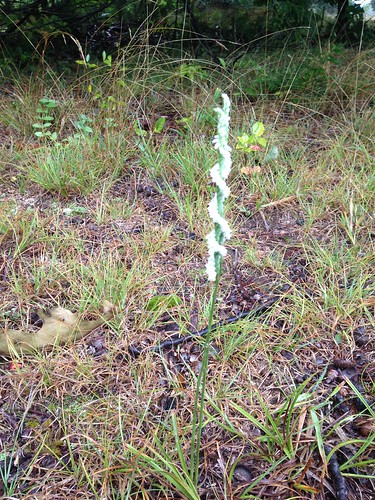
Spiranthes is a genus of orchids in the subfamily Orchidoideae. They are known commonly as ladies tresses, ladies'-tresses, or lady's tresses. The genus is distributed in the Americas, Eurasia, and Australia.
Around the World in 80 Days
By Jules Verne, Chapter XII
In which Phileas Fogg and His Companions Venture Across the Indian Forests, and what Ensued
In order to shorten the journey, the guide passed to the left of the line where the railway was still in process of being built. This line, owing to the capricious turnings of the Vindhia Mountains, did not pursue a straight course. The Parsee, who was quite familiar with the roads and paths in the district, declared that they would gain twenty miles by striking directly through the forest.
Phileas Fogg and Sir Francis Cromarty, plunged to the neck in the peculiar howdahs provided for them, were horribly jostled by the swift trotting of the elephant, spurred on as he was by the skilful Parsee; but they endured the discomfort with true British phlegm, talking little, and scarcely able to catch a glimpse of each other. As for Passepartout, who was mounted on the beast’s back, and received the direct force of each concussion as he trod along, he was very careful, in accordance with his master’s advice, to keep his tongue from between his teeth, as it would otherwise have been bitten off short. The worthy fellow bounced from the elephant’s neck to his rump, and vaulted like a clown on a spring-board; yet he laughed in the midst of his bouncing, and from time to time took a piece of sugar out of his pocket, and inserted it in Kiouni’s trunk, who received it without in the least slackening his regular trot.
After two hours the guide stopped the elephant, and gave him an hour for rest, during which Kiouni, after quenching his thirst at a neighbouring spring, set to devouring the branches and shrubs round about him. Neither Sir Francis nor Mr. Fogg regretted the delay, and both descended with a feeling of relief. “Why, he’s made of iron!” exclaimed the general, gazing admiringly on Kiouni.
Of forged iron,” replied Passepartout, as he set about preparing a hasty breakfast.
At noon the Parsee gave the signal of departure. The country soon presented a very savage aspect. Copses of dates and dwarf-palms succeeded the dense forests; then vast, dry plains, dotted with scanty shrubs, and sown with great blocks of syenite. All this portion of Bundelcund, which is little frequented by travellers, is inhabited by a fanatical population, hardened in the most horrible practices of the Hindoo faith. The English have not been able to secure complete dominion over this territory, which is subjected to the influence of rajahs, whom it is almost impossible to reach in their inaccessible mountain fastnesses. The travellers several times saw bands of ferocious Indians, who, when they perceived the elephant striding across-country, made angry arid threatening motions. The Parsee avoided them as much as possible. Few animals were observed on the route; even the monkeys hurried from their path with contortions and grimaces which convulsed Passepartout with laughter.
In the midst of his gaiety, however, one thought troubled the worthy servant. What would Mr. Fogg do with the elephant when he got to Allahabad? Would he carry him on with him? Impossible! The cost of transporting him would make him ruinously expensive. Would he sell him, or set him free? The estimable beast certainly deserved some consideration. Should Mr. Fogg choose to make him, Passepartout, a present of Kiouni, he would be very much embarrassed; and these thoughts did not cease worrying him for a long time.
The principal chain of the Vindhias was crossed by eight in the evening, and another halt was made on the northern slope, in a ruined bungalow. They had gone nearly twenty-five miles that day, and an equal distance still separated them from the station of Allahabad.
The night was cold. The Parsee lit a fire in the bungalow with a few dry branches, and the warmth was very grateful, provisions purchased at Kholby sufficed for supper, and the travellers ate ravenously. The conversation, beginning with a few disconnected phrases, soon gave place to loud and steady snores. The guide watched Kiouni, who slept standing, bolstering himself against the trunk of a large tree. Nothing occurred during the night to disturb the slumberers, although occasional growls front panthers and chatterings of monkeys broke the silence; the more formidable beasts made no cries or hostile demonstration against the occupants of the bungalow. Sir Francis slept heavily, like an honest soldier overcome with fatigue. Passepartout was wrapped in uneasy dreams of the bouncing of the day before. As for Mr. Fogg, he slumbered as peacefully as if he had been in his serene mansion in Saville Row.
The journey was resumed at six in the morning; the guide hoped to reach Allahabad by evening. In that case, Mr. Fogg would only lose a part of the forty-eight hours saved since the beginning of the tour. Kiouni, resuming his rapid gait, soon descended the lower spurs of the Vindhias, and towards noon they passed by the village of Kallenger, on the Cani, one of the branches of the Ganges. The guide avoided inhabited places, thinking it safer to keep the open country, which lies along the first depressions of the basin of the great river. Allahabad was now only twelve miles to the north-east. They stopped under a clump of bananas, the fruit of which, as healthy as bread and as succulent as cream, was amply partaken of and appreciated.
At two o’clock the guide entered a thick forest which extended several miles; he preferred to travel under cover of the woods. They had not as yet had any unpleasant encounters, and the journey seemed on the point of being successfully accomplished, when the elephant, becoming restless, suddenly stopped.
It was then four o’clock.
What’s the matter?” asked Sir Francis, putting out his head.
I don’t know, officer,” replied the Parsee, listening attentively to a confused murmur which came through the thick branches.
The murmur soon became more distinct; it now seemed like a distant concert of human voices accompanied by brass instruments. Passepartout was all eyes and ears. Mr. Fogg patiently waited without a word. The Parsee jumped to the ground, fastened the elephant to a tree, and plunged into the thicket. He soon returned, saying:
A procession of Brahmins is coming this way. We must prevent their seeing us, if possible.”
The guide unloosed the elephant and led him into a thicket, at the same time asking the travellers not to stir. He held himself ready to bestride the animal at a moment’s notice, should flight become necessary; but he evidently thought that the procession of the faithful would pass without perceiving them amid the thick foliage, in which they were wholly concealed.
The discordant tones of the voices and instruments drew nearer, and now droning songs mingled with the sound of the tambourines and cymbals. The head of the procession soon appeared beneath the trees, a hundred paces away; and the strange figures who performed the religious ceremony were easily distinguished through the branches. First came the priests, with mitres on their heads, and clothed in long lace robes. They were surrounded by men, women, and children, who sang a kind of lugubrious psalm, interrupted at regular intervals by the tambourines and cymbals; while behind them was drawn a car with large wheels, the spokes of which represented serpents entwined with each other. Upon the car, which was drawn by four richly caparisoned zebus, stood a hideous statue with four arms, the body coloured a dull red, with haggard eyes, dishevelled hair, protruding tongue, and lips tinted with betel. It stood upright upon the figure of a prostrate and headless giant.
Sir Francis, recognising the statue, whispered, “The goddess Kali; the goddess of love and death.”
Of death, perhaps,” muttered back Passepartout, “but of love — that ugly old hag? Never!”
The Parsee made a motion to keep silence.
A group of old fakirs were capering and making a wild ado round the statue; these were striped with ochre, and covered with cuts whence their blood issued drop by drop — stupid fanatics, who, in the great Indian ceremonies, still throw themselves under the wheels of Juggernaut. Some Brahmins, clad in all the sumptuousness of Oriental apparel, and leading a woman who faltered at every step, followed. This woman was young, and as fair as a European. Her head and neck, shoulders, ears, arms, hands, and toes were loaded down with jewels and gems with bracelets, earrings, and rings; while a tunic bordered with gold, and covered with a light muslin robe, betrayed the outline of her form.
The guards who followed the young woman presented a violent contrast to her, armed as they were with naked sabres hung at their waists, and long damascened pistols, and bearing a corpse on a palanquin. It was the body of an old man, gorgeously arrayed in the habiliments of a rajah, wearing, as in life, a turban embroidered with pearls, a robe of tissue of silk and gold, a scarf of cashmere sewed with diamonds, and the magnificent weapons of a Hindoo prince. Next came the musicians and a rearguard of capering fakirs, whose cries sometimes drowned the noise of the instruments; these closed the procession.
Sir Francis watched the procession with a sad countenance, and, turning to the guide, said, “A suttee.”
The Parsee nodded, and put his finger to his lips. The procession slowly wound under the trees, and soon its last ranks disappeared in the depths of the wood. The songs gradually died away; occasionally cries were heard in the distance, until at last all was silence again.
Phileas Fogg had heard what Sir Francis said, and, as soon as the procession had disappeared, asked: “What is a suttee?”
A suttee,” returned the general, “is a human sacrifice, but a voluntary one. The woman you have just seen will be burned to-morrow at the dawn of day.”
Oh, the scoundrels!” cried Passepartout, who could not repress his indignation.
And the corpse?” asked Mr. Fogg.
Is that of the prince, her husband,” said the guide; “an independent rajah of Bundelcund.”
Is it possible,” resumed Phileas Fogg, his voice betraying not the least emotion, “that these barbarous customs still exist in India, and that the English have been unable to put a stop to them?”
These sacrifices do not occur in the larger portion of India,” replied Sir Francis; “but we have no power over these savage territories, and especially here in Bundelcund. The whole district north of the Vindhias is the theatre of incessant murders and pillage.”
The poor wretch!” exclaimed Passepartout, “to be burned alive!”
Yes,” returned Sir Francis, “burned alive. And, if she were not, you cannot conceive what treatment she would be obliged to submit to from her relatives. They would shave off her hair, feed her on a scanty allowance of rice, treat her with contempt; she would be looked upon as an unclean creature, and would die in some corner, like a scurvy dog. The prospect of so frightful an existence drives these poor creatures to the sacrifice much more than love or religious fanaticism. Sometimes, however, the sacrifice is really voluntary, and it requires the active interference of the Government to prevent it. Several years ago, when I was living at Bombay, a young widow asked permission of the governor to be burned along with her husband’s body; but, as you may imagine, he refused. The woman left the town, took refuge with an independent rajah, and there carried out her self-devoted purpose.”
While Sir Francis was speaking, the guide shook his head several times, and now said: “The sacrifice which will take place to-morrow at dawn is not a voluntary one.”
How do you know?”
Everybody knows about this affair in Bundelcund.”
But the wretched creature did not seem to be making any resistance,” observed Sir Francis.
That was because they had intoxicated her with fumes of hemp and opium.”
But where are they taking her?”
To the pagoda of Pillaji, two miles from here; she will pass the night there.”
And the sacrifice will take place —”
To-morrow, at the first light of dawn.”
The guide now led the elephant out of the thicket, and leaped upon his neck. Just at the moment that he was about to urge Kiouni forward with a peculiar whistle, Mr. Fogg stopped him, and, turning to Sir Francis Cromarty, said, “Suppose we save this woman.”
Save the woman, Mr. Fogg!”
I have yet twelve hours to spare; I can devote them to that.”
Why, you are a man of heart!”
Sometimes,” replied Phileas Fogg, quietly; “when I have the time.”
(to be continued)
New Echota, Vann Tavern
Photos by Bob Kirchman
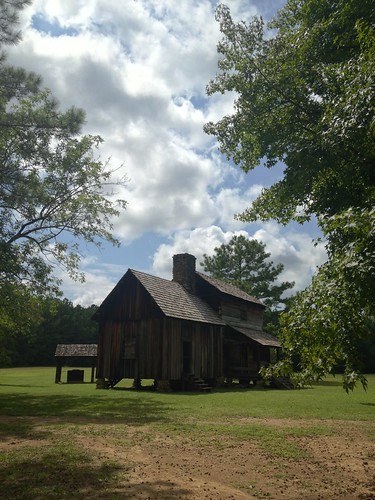
Vann Tavern was built around 1805 by James Vann. He was a wealthy Cherokee plantation owner. The Nineteenth Century tavern served travelers as restaurant, store and inn. An outside stair led to guest quarters upstairs and the window on the porch served as a ‘takeout window’ for those the innkeeper would not allow inside. Although this particular building was moved to New Echota from Forsyth County, Georgia, it is representative of the tavern that would likely have stood here.
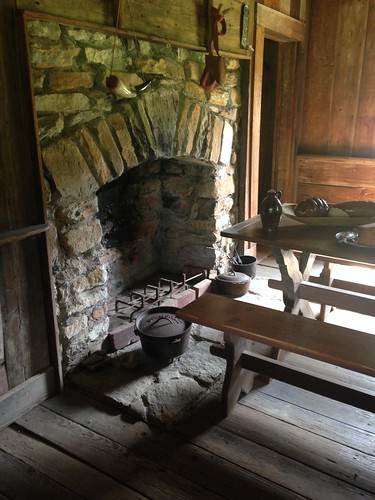
Interior of Vann Tavern.
Callanwolde
The Candler Mansion in Atlanta
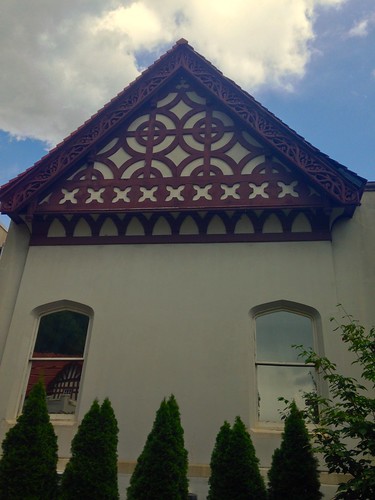
An intricate gable detail designed by Henry Hornbostel for Howard Candler, President of the Coca-Cola Company. Callanwolde was built in 1920. Photo by Bob Kirchman.
Callanwolde, the magnificent Tudor Revival style home of the Charles Howard Candler family, was completed in 1920. Howard Candler, the oldest son of Asa Griggs Candler (founder of The Coca-Cola Company), was the President of The Coca-Cola Company from 1916 to 1923. Today the home serves Atlanta as an arts center.
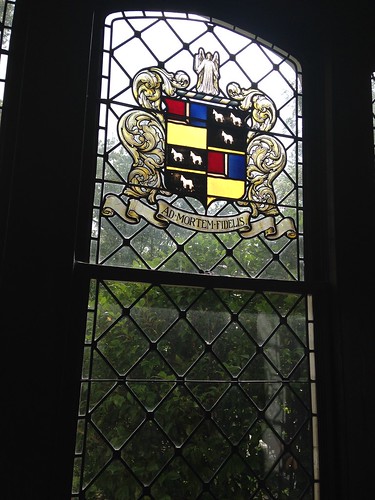
Family Crest in a window. Photo by Bob Kirchman.
Candler family lore holds that William Candler of Newcastle-upon-Tyne served as an officer in Cromwell’s Army during the Irish Rebellion of the mid-17th century. Candler served in Sir Hardress Waller’s Regiment and after the end of the campaign was elevated to the rank of Lieutenant Colonel for “meritorious conduct in the field” by a grateful Cromwell and Parliament and granted lands in the Barony of Callan, County Kilkenny. He brought his wife, Anne Villiers, widow of Capt. John Villiers, and family over to Ireland and made their Irish home at Callan Castle. The name “Callanwolde” is based on this family connection to the Irish town of Callan and the Old English word for “woods” (“wolde”).” – History of Callanwolde

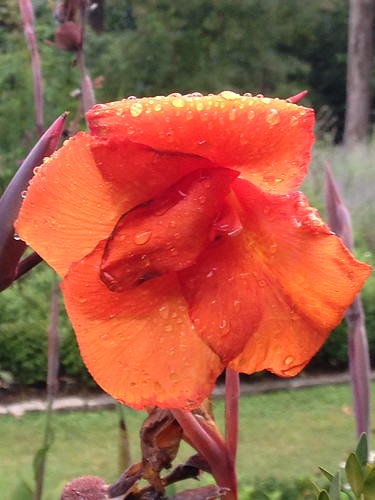
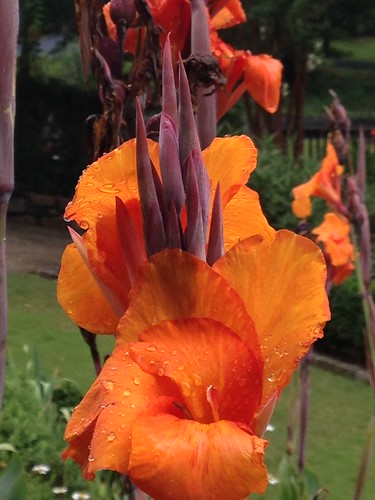
Canna Lilys in Callanwolde's formal gardens.
Photos by Bob Kirchman.
C. S. Lewis
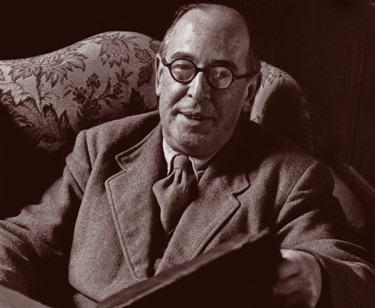
C. S. Lewis.
God created things which had free will. That means creatures which can go wrong or right. Some people think they can imagine a creature which was free but had no possibility of going wrong, but I can't. If a thing is free to be good it's also free to be bad. And free will is what has made evil possible. Why, then, did God give them free will? Because free will, though it makes evil possible, is also the only thing that makes possible any love or goodness or joy worth having. A world of automata -of creatures that worked like machines- would hardly be worth creating. The happiness which God designs for His higher creatures is the happiness of being freely, voluntarily united to Him and to each other in an ecstasy of love and delight compared with which the most rapturous love between a man and a woman on this earth is mere milk and water. And for that they've got to be free.
Of course God knew what would happen if they used their freedom the wrong way: apparently, He thought it worth the risk. (...) If God thinks this state of war in the universe a price worth paying for free will -that is, for making a real world in which creatures can do real good or harm and something of real importance can happen, instead of a toy world which only moves when He pulls the strings- then we may take it it is worth paying.” – C.S. Lewis, The Case for Christianity
Anne Morrow Lindbergh
Trading Sky for Sea
By Hayley Morgan
Hayley is a mom of boys and a leader of women. She is the co-founder of The Influence Network and Wildly Co. She is the editor of The Tiny Twig [click to read]and her first book Wild and Free will be published by Zondervan in May 2016. The following is reposted with her permission:
Ink bottle, pen and notebook waited on the beach house desk, but for now Anne Morrow Lindbergh ambled along the Captiva shoreline looking for seashells to add to her collection. There, she spotted a little spiral shell. She rolled it in her hand and thought about the calm of this vacation by herself, the dizziness of her days back home, and what it would take “to remain whole in the midst of the distractions of life…to remain balanced, no matter what centrifugal forces tend to pull one off center.” When she married world-famous aviator, Charles Lindbergh, she jumped right into his world, this tiny woman taking on big adventure as co-pilot, studying stars and logging flight plans. But she was more than propellers and airplane smoke. Even as she pursued her husband’s dreams, she brought her own creative passion along for the ride. She wrote award-winning novels based on their exploration over the world’s air routes and lent her writing skills to her husband’s autobiography “The Spirit of St. Louis.” He dedicated the book: “To A.M.L. who will never realize how much of this book she has written.”
But there was a new passion on the horizon, one that wouldn’t fit in the cockpit. On Mrs. Lindbergh’s 24th birthday, she delivered Baby Lindbergh. Flights went on and she felt the gravity of leaving her little one behind. Gradually, she gave up the turbulence of the skies to put her feet on the ground as a fully-present mom. She would forever cherish the fleeting moments with her firstborn. Her dream turned nightmare in 1932 when kidnappers stole her son from his nursery and killed him in a ransom deal gone bad. She grieved as privately as possible in the midst of media frenzy, and used the pen to work out her sadness on the pages of her journal. Welcoming five more children after that tragic loss, she did her best to remain open to life no matter what it may bring.
Motherhood wasn’t easy. She’d be the first to say so: “Is this then what happens to a woman? She wants perpetually to spill herself away. All her instinct as a woman–the eternal nourisher of children, of men, of society–demands that she give. Her time, her energy, her creativeness drain out into these channels if there is any chance, any leak.” All the stains to scrub, casseroles to cook, floors to sweep, baths to give, budgets to balance, appointments to make, parties to plan, messages to write– these leave us feeling drained, unless we are giving purposefully and being refilled. Anne Morrow Lindbergh went to Captiva Island not for the adventure of travel, but to find quiet renewal at the water’s edge. In solitude she held out her cup to be filled to overflowing.
Certain springs are tapped only when we are alone,” she wrote, “The artist knows he must be alone to create; the writer, to work out his thoughts; the musician, to compose; the saint, to pray [and] women need solitude in order to find again the true essence of themselves.” Mrs. Lindbergh went to the shore as a woman cluttered with life’s complications. She came home with a simple collection of shells and thoughtful words that became her famous memoir, Gift from the Sea. And so she took up a new passion, spurring women on to find creative pause, encouraging us to fill up so we can serve as we were “meant to in the eye of God.” All quotes are from Gift from the Sea. For more on Anne Morrow Lindbergh, you’ll want to read: Hour of Gold, Hour of Lead: Diaries and Letters of Anne Morrow Lindbergh, 1929-1932 [1.]
